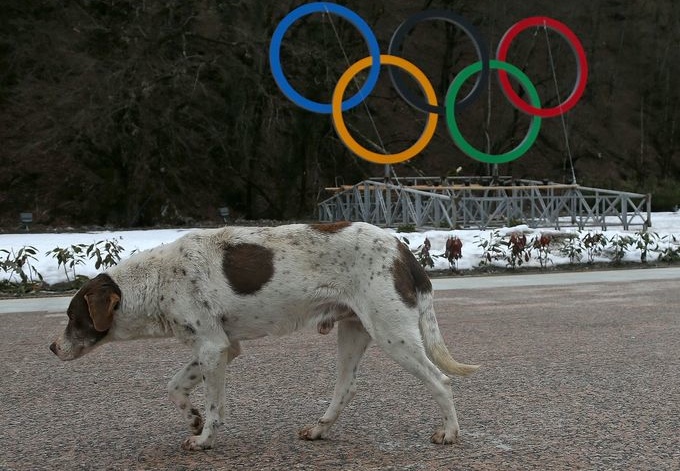Last April, officials in Sochi, Russia announced they would be cancelling their plan to cull stray dogs in their city before the 2014 Winter Olympic Games. In response to public outrage from animal advocates over the city’s plan to pay exterminators more than 1.7 million rubles (the equivalent of $54,000 USD) to rid the city of its strays, the administration claimed they would instead construct an animal shelter.
“The animal shelter will be built and maintained by the Dobromir charity organization,” the Sochi administration said in a statement. “All of the required documents are currently being finalized.”
But as the Russian city prepares to kick off the festivities this Friday, February 6, it seems they have changed their minds about following through with a more humane solution to Sochi’s homeless animal problem. At least 2,000 dogs are set to lose their lives in a mass extermination effort ahead of the Olympics.
Alexei Sorokin, the director general of Russian pest control firm Basya Services, tells the ABC News that disposing of the thousands of strays ahead of the Olympic Games is a safety issue.
“Imagine, if during an Olympic games, a ski jumper landed at 130 kilometres an hour [over 80 mph] and a dog runs into him when he lands,” Sorokin says. “It would be deadly for both a jumper and for the stray dog.”
“Dogs must be taken off the streets even if that means putting them to sleep,” he adds.
But these animals don’t get a pain-free death, CTV News reports. Instead, thousands of Russian stray dogs and cats are fed poisoned food, shot, beaten to death, or stabbed in the name of clearing city streets.
Sorokin claims there are packs of dogs roaming wild that pose a threat to Olympic visitors, saying these animals carry “an epidemic of rabies.”
“I am for the right of people to walk the streets without fear of being attacked by packs of dogs,” he says.
Just last week, during a rehearsal of the opening ceremony, Sorokin tells the Associated Press he and other spectators saw a stray dog walking amongst the performers.
“A dog ran into the Fisht Stadium,” he says, “we took it away. God forbid something like this happens at the actual opening ceremony. This will be a disgrace for the whole country.”
Sorokin feels he is performing an important service that he and his company are there to eradicate vermin.
“Let’s call things by their real name,” he says. “These dogs are biological trash.”
Though there are people on the ground in Russia working hard to bring these homeless pets to safety, it is nearly impossible to work fast enough. Two of these rescuers, women who work tirelessly to catch and rehabilitate these homeless animals, have saved more than 800 animals in only a year and a half. But as government-funded efforts to exterminate these same dogs and cats ramp up in the name of Olympic safety, it is hard for these advocates to keep up. For each animal the pair saves, 10 more animals are killed.
Several animal advocates have started online petitions in an effort to halt these inhumane acts. Tampa, Florida resident Oliya Michaela’s Change.org petition, addressed to Sochi mayor Anatoly Pakhomov, urges Russian officials to try “less barbaric” methods like placing homeless pets in animal shelters and instituting a spay/neuter program. Michaela’s petition has earned nearly one-fifth of its target 50,000 signatures so far.
And concerned animal lover Ekaterina Bourgois is just shy of achieving her goal of 32,000 signatures on her ThePetitionSite.com petition, with people from all around the world signing their names.
But many Russian officials seem to feel differently, supporting these drastic and brutal methods. Sergei Krivonosov, a lawmaker from the Krasnodar region — a region that includes Sochi — voiced his support for the extermination efforts. Though he admits it is “not the most humane way” to get strays off of the streets, he still feels it will be worth it in the end, calling it Russia’s “responsibility to the international community and that their elimination is the quickest way to solve this problem.”
Sources: RIA Novosti, Associated Press, CTV News, ABC News







